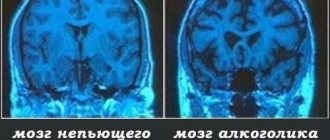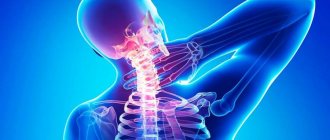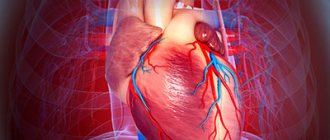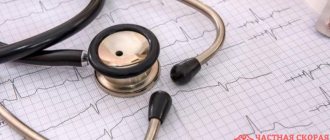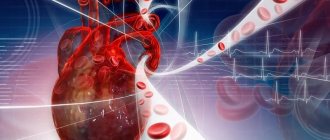About the effect of alcohol on blood vessels and the heart
The liver and kidneys suffer the most when drinking alcohol. The heart is the third organ on which the influence of alcohol is most destructive. Ethanol destroys heart muscle cells and sticks red blood cells together in the bloodstream.
In response to this harmful effect of alcohol on the circulatory system, blood vessels rapidly dilate and blood flow slows down. In an experienced alcoholic, the blood turns into a cheesy mass, and clots of stuck together red blood cells, circulating throughout the bloodstream, form blockages in blood vessels.
The resulting blood clots prevent nutrients and oxygen from reaching the heart. Over time, the heart tissue dies and becomes scarred. The muscle loses its natural elasticity and constantly works at the limit of its capabilities. Almost inevitably, all this leads to myocardial infarction.
The heart of a drinking person is always increased in volume, and among doctors it is called a “bull” heart. The official medical diagnosis of this pathology is alcoholic cardiomyopathy. The disease leads to rapid depletion of the valves and severe heart failure.
Stages of alcoholism
People don't become alcoholics right away. Addiction develops gradually. At first, the patient drinks occasionally, and then loses vigilance, the amount and frequency of alcohol consumption increases. There are 3 stages:
- First . A person periodically experiences a strong desire to relieve stress with the help of alcohol, but this does not happen all the time. There are no symptoms of serious damage to organs or the psyche yet, so everything seems harmless and safe. There are usually no conflicts in the family over alcohol.
- Second . The dosage of drinking increases due to increased tolerance to alcohol. A person can drink a lot and not feel nauseated or very intoxicated, but in the morning he feels very bad due to a hangover.
- Third . The life of an alcoholic comes down to the search for alcohol. He forgets about work, family and strives not to get sober at all. Gets drunk instantly, even with small doses due to damage to liver cells, but never stops after a couple of glasses. A hangover turns into a severe withdrawal syndrome, which can be accompanied by hypertension, incessant vomiting, severe migraines, and insomnia.
Alcohol causes strong physical and psychological dependence, which is very difficult to get rid of on your own. The more a person drinks, the stronger the addiction and the weaker the will. Psychology play a big role . If a person is surrounded only by people who drink, it was customary in his family to drink alcohol constantly, he will do the same in order not to stand out.
What happens when you drink alcohol for a long time
Heavy drinkers die from the direct effects of alcohol on the heart 22 times more often than non-drinkers.
Myocardial infarction, varicose veins, alcoholic cardiomyopathy, stroke, hypertensive crisis are the most common diagnoses of drinkers related to the cardiovascular system. To push through thickened blood, the body urgently turns on compensatory forces: it increases blood pressure. But in people who drink regularly, the vascular walls are inelastic and thinned. Against the background of increased blood pressure, capillaries usually cannot withstand and rupture. And this is the main cause of strokes in alcoholics.
Factors that provoke increased blood pressure
Blood pressure can increase slightly for a number of reasons. You should be concerned when it is constantly at an elevated level. The main factors that can cause increased blood pressure include:
- abnormalities in the functioning of the nervous system (for example, stressful situations or depressive situations);
- sleep disturbance (insomnia);
- excess weight (obesity);
- use of certain medications (in particular, when the recommended dose is exceeded);
- sedentary lifestyle (limitation of general physical activity);
- congenital diseases (heart defects);
- poor diet (predominance of salty foods).
Cardiovascular health: how to take care of it
The heart has no days off or holidays. The organ works smoothly in any circumstances, and always needs all possible support. Regardless of whether there are obvious heart problems or they are not yet felt, you need to take care of the main engine constantly.
Give up alcohol and cigarettes forever. The most destructive effect of alcohol on the heart and blood vessels occurs as a result of a combination of these two bad habits. Nicotine excessively constricts blood vessels, creating oxygen starvation; alcohol, on the contrary, dilates blood arteries, making them fragile. If an alcoholic smokes more than 3 cigarettes a day, the likelihood of a stroke or heart attack increases 3 times than if he simply abused alcohol. But both habits are deadly separately.
Watch your weight. Overweight people are always at risk. Fat that envelops internal organs is the most dangerous: unlike subcutaneous fat, it is almost impossible to eliminate. In such cases, myocardial dysfunction occurs much more often. Running, walking, swimming and cycling can help you lose weight, but the permissible load should only be determined by a specialist.
Review your diet:
- Replace pork and lard with beef and poultry.
- Drink no more than 1.5 liters of clean water per day so as not to cause swelling.
- Remove canned food from your diet and do not exceed the daily salt intake - 5 grams.
- Limit your coffee intake or eliminate it completely.
- Apples, dark grapes, plums, strawberries, garlic, flax seeds, grape seeds, arugula, onions, asparagus, nuts, honey and fatty fish are those foods that are good for blood vessels and the heart, which should be included in the diet regularly or as often as possible .
The harm of alcohol and its harmful effects on the heart and blood vessels is difficult to exaggerate. But there is no benefit, even conditional, from alcoholic drinks. And if a young body can somehow resist the threat, then after 40 years the consequences of drinking alcohol can cost one’s life.
Is it possible to regulate blood pressure?
Hypertension is one of the most common problems among people of different age categories. Many people mistakenly believe that it only occurs in older people. However, high blood pressure also affects young people. Symptoms indicating persistently elevated blood pressure are vague. Based on this, many people do not know that they have problems with blood pressure.
Experts advise determining your working pressure and, from the age of 25, making sure that it does not deviate from the norm. The diagnosis of “arterial hypertension” can only be made by a doctor, so if there is a surge in blood pressure, you should not delay visiting him. He will talk about ways to lower and increase blood pressure if necessary. There are many medications that can be used to maintain normal blood pressure; they are prescribed on an individual basis . You should not self-medicate and try to control your blood pressure with alcohol - this can harm your health.
What to do to avoid dangerous consequences?
You should not lead to the emergence of such dangerous diseases as cirrhosis, schizophrenia, cancer. The drug treatment clinic “Private Ambulance No. 1” will help you cope with addiction. We provide treatment for alcoholism at any stage. We have modern equipment for diagnostics. We will determine which diseases and disorders are caused by alcoholism, and select treatment, including:
- Withdrawal from binge drinking at home or in a clinic;
- Psychological or medicinal coding;
- Psychological consultations;
- Drug therapy for rapid restoration of internal organs;
- Rehabilitation and post-treatment management of patients.
We will select effective treatment. We employ experienced narcologists, psychologists, and psychotherapists. Treatment involves more than just medication. We strive to completely change a person's view of himself, his life and alcohol. Alcohol should not be high on the list of values. Our specialists will help you get rid of fears, psychological problems, physical addictions, and gain self-confidence.
You can make an appointment with a doctor or call a specialist to your home.
We work around the clock, seven days a week. If you or your loved one feel unwell or have problems due to prolonged drinking, call us at any time. The psychologist will conduct a conversation with the patient, explain the need for treatment, offer options, and motivate. Staying in the hospital will allow you to get a lasting positive result faster. We provide a 3-year guarantee against failure.
Consequences for the psyche
Contrary to popular belief that alcohol helps you relax, it is detrimental to the psyche. It is impossible to get rid of depression with its help. The more an alcoholic drinks, the more noticeable the changes for his loved ones:
- Increased irritability and aggression;
- Mood can change suddenly for no reason;
- Apathy increases, interest in everything that is not related to alcohol disappears;
- Mental abilities decrease;
- A person forgets even immediate events, does not remember what he said yesterday;
- Hysterical attacks occur (more often in the weaker sex);
- The social circle is narrowing, only people who drink remain.
An alcoholic violates not only his own psyche, but also the psyche of his child. If a family constantly experiences heavy drinking by parents, conflicts, and quarrels, children develop psychological trauma and the formation of moral qualities is disrupted. A child may feel guilty throughout his life for his parents’ alcoholism or follow in their footsteps because he is used to seeing such behavior.
Over time, mental disorders progress, signs of alcoholic delirium and asthenic neurosis appear. Pathologies can have 2 opposite directions. Some people experience complete apathy and dysphoria. They are unable to experience joy from anything and are constantly depressed. In others, excitability increases greatly and attacks of uncontrolled aggression appear.
Also, do not forget about alcoholic dementia. Alcoholics do not notice how their intellectual abilities decrease and critical thinking is lost. Dementia can reach the point where a person does not recognize himself or his family, and does not understand where he is.
Consequence groups
The peculiarity of alcoholism is that a person, when faced with the consequences, does not realize how dangerous they are. Often fear for one's life appears only with the first pain or heart attack .
The consequences of chronic alcoholism are divided into several groups:
- Social . An alcoholic destroys connections with family and loved ones. The likelihood of committing a crime and getting injured increases.
- Medical . Ethyl alcohol interferes with the blood circulation of internal organs, causes vasospasm, and increases the risk of developing cancer, heart attack and stroke. Absolutely all systems and organs suffer.
- Mental . Due to central nervous system disorders, alcoholics often experience severe mental disorders. Such consequences can only be eliminated by an experienced specialist, subject to treatment in a hospital.
If you regularly drink alcohol, characteristic external signs will appear. Usually this is swelling, puffiness of the face (especially under the eyes), unstable gait, dull or yellowish skin color. The figure also changes. Men begin to gain weight according to the female type. Fat is deposited in the abdomen, hips, and chest.
The causes of the disease often lie in psychological problems and childhood traumas. A person drinks to forget, but only multiplies his problems. It destroys physical and mental health, family, career, but cannot get rid of depression. Alcohol only increases anxiety and fears, so it is by no means an antidepressant.
Harm of ethyl alcohol for male and female bodies
In fact, ethanol has a destructive effect on any organism. It is believed that in men the effects appear later , but this is only in the case of equal dosages. As a rule, men drink more alcohol and choose stronger drinks, so the rate of cell destruction in the male body is not very different.
For women, alcoholism can become an even more serious problem due to physiological characteristics. Addiction appears much faster in the weaker sex. But the fact that female alcoholism cannot be treated is nothing more than a myth . The right approach and proper treatment will help you get rid of a bad habit.
In the weaker sex, depression develops faster due to alcoholism, and changes in behavior are noticeable. The reproductive system continues to work, but the likelihood of having a healthy child is greatly reduced . Many women with alcoholism do not carry children to term. Alcohol also brings menopause closer and provokes voice changes and premature skin aging.
For men, alcoholism is dangerous due to infertility and impotence. As you know, alcohol contains phytoestrogens, female sex hormones, which leads to hormonal imbalance. The liver, which is responsible for breaking down estrogen, suffers, so its levels continue to rise. Among the unpleasant consequences of such disorders can be found gynecomastia (breast enlargement in men), drying out of muscle tissue, and decreased potency.
